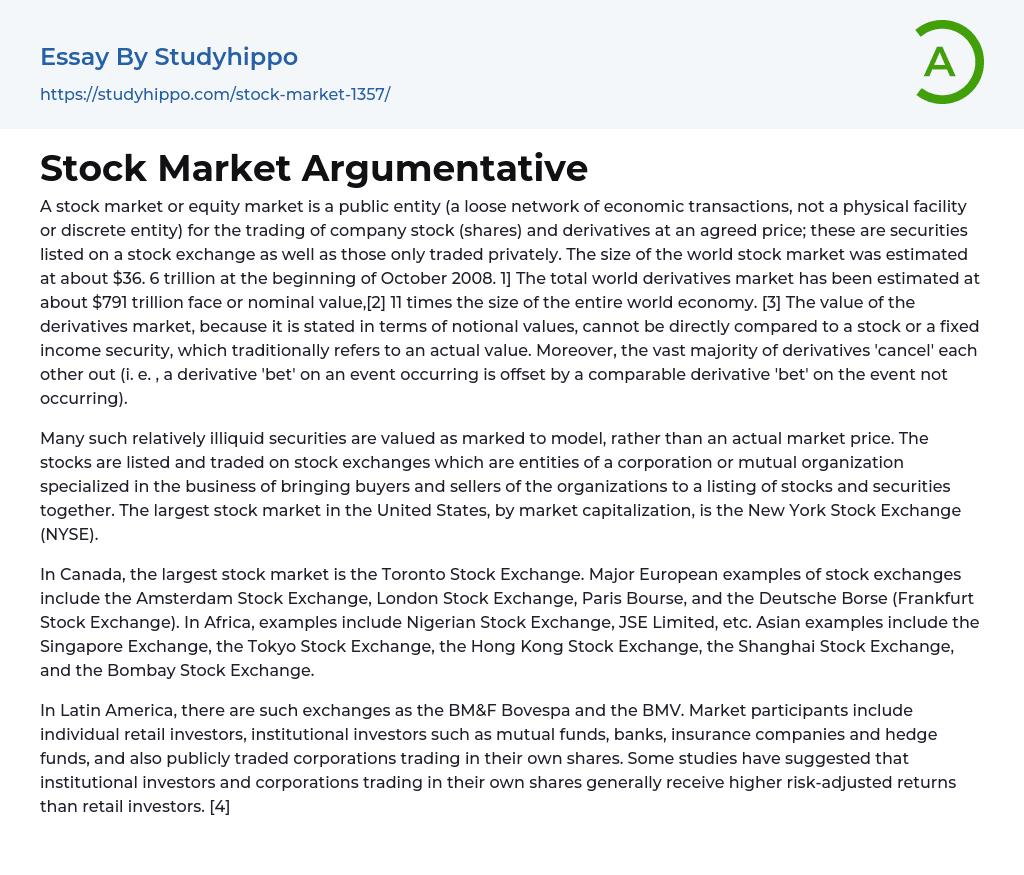A stock market or equity market is a public entity (a loose network of economic transactions, not a physical facility or discrete entity) for the trading of company stock (shares) and derivatives at an agreed price; these are securities listed on a stock exchange as well as those only traded privately. The size of the world stock market was estimated at about $36. 6 trillion at the beginning of October 2008. 1] The total world derivatives market has been estimated at about $791 trillion face or nominal value,[2] 11 times the size of the entire world economy. [3] The value of the derivatives market, because it is stated in terms of notional values, cannot be directly compared to a stock or a fixed income security, which traditionally refers to an actual value. Moreover, the vast majority of derivatives 'cancel' each other out (i. e. , a deriva
...tive 'bet' on an event occurring is offset by a comparable derivative 'bet' on the event not occurring).
Many such relatively illiquid securities are valued as marked to model, rather than an actual market price. The stocks are listed and traded on stock exchanges which are entities of a corporation or mutual organization specialized in the business of bringing buyers and sellers of the organizations to a listing of stocks and securities together. The largest stock market in the United States, by market capitalization, is the New York Stock Exchange (NYSE).
In Canada, the largest stock market is the Toronto Stock Exchange. Major European examples of stock exchanges include the Amsterdam Stock Exchange, London Stock Exchange, Paris Bourse, and the Deutsche Borse (Frankfurt Stock Exchange). In Africa, examples include Nigerian Stoc
Exchange, JSE Limited, etc. Asian examples include the Singapore Exchange, the Tokyo Stock Exchange, the Hong Kong Stock Exchange, the Shanghai Stock Exchange, and the Bombay Stock Exchange.
In Latin America, there are such exchanges as the BM&F Bovespa and the BMV. Market participants include individual retail investors, institutional investors such as mutual funds, banks, insurance companies and hedge funds, and also publicly traded corporations trading in their own shares. Some studies have suggested that institutional investors and corporations trading in their own shares generally receive higher risk-adjusted returns than retail investors. [4]
- Accounting essays
- Andrew Carnegie essays
- Automation essays
- Business Cycle essays
- Business Intelligence essays
- Business Model essays
- Business Operations essays
- Business Software essays
- Cooperation essays
- Cooperative essays
- Corporate Social Responsibility essays
- Corporation essays
- Customer Relationship Management essays
- Family Business essays
- Franchising essays
- Harvard Business School essays
- Harvard university essays
- Human Resource Management essays
- Infrastructure essays
- Inventory essays
- Logistics essays
- Management essays
- Manufacturing essays
- Market essays
- Marketing essays
- Multinational Corporation essays
- News Media essays
- Online Shopping essays
- Quality Assurance essays
- Richard Branson essays
- Sales essays
- Selling essays
- Shopping Mall essays
- Small Business essays
- Starting a Business essays
- Stock essays
- Strategy essays
- Structure essays
- Trade Union essays
- Waste essays
- Bank essays
- Banking essays
- Corporate Finance essays
- Credit Card essays
- Currency essays
- Debt essays
- Donation essays
- Enron Scandal essays
- Equity essays
- Financial Accounting essays




